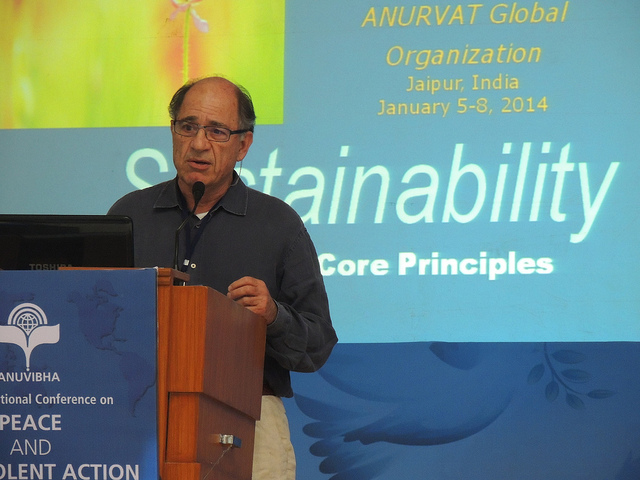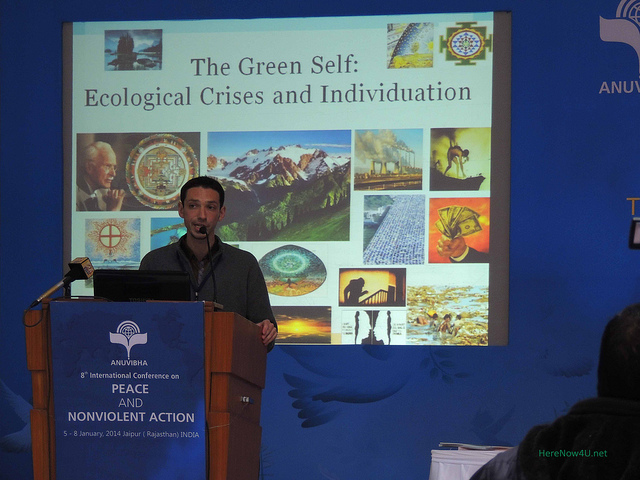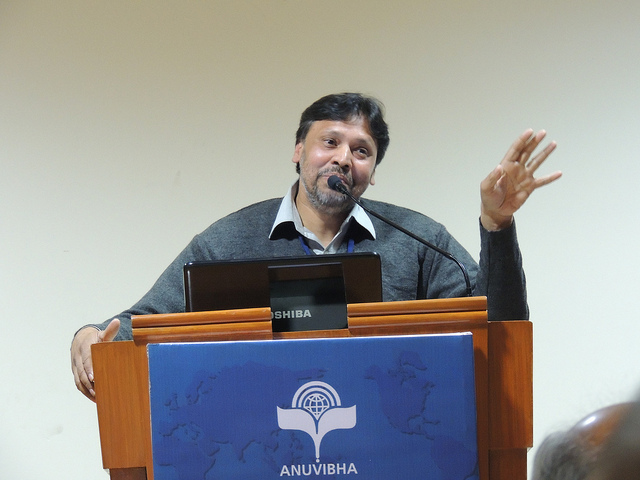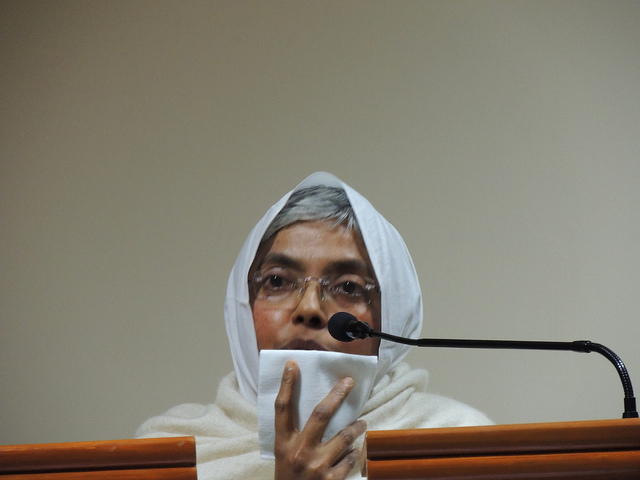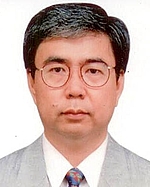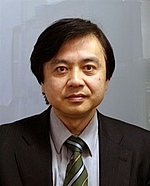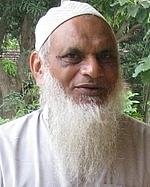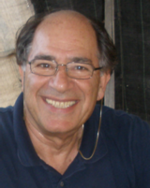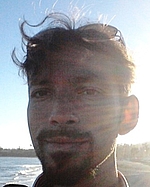Der Nachmittag begann mit der ersten Plenumssitzung. Drei Redner wollten ihre Gedanken zum Thema „Gewaltlosigkeit - Wahrnehmung, Praxis und Konzept“ vortragen. Die Plenumssitzungen waren so strukturiert, dass der Vorsitzende die Vortragenden vorstellte, ihnen das Wort erteilte, sie um Einhaltung des Zeitplans bat und schließlich alle Beiträge noch einmal zusammenfasste. Das sollte jeweils in 90 Minuten geschehen sein. Zeit für eine Aussprache war nicht vorgesehen, doch waren Fragen möglich.
Alle Anwesenden waren noch frisch an diesem ersten Nachmittag, von dem ich nun nur noch weiß, dass ich die ganze Zeit während der ersten Plenumssitzung anwesend war. Eigentlich schade, hatte ich mir doch von dem Thema einiges an Anregungen versprochen. So nutzte ich die Zeit zur Meditation über das Thema. Lediglich den Beitrag von Dr. Cader (Sri Lanka) habe ich in Erinnerung wegen seiner Fähigkeit, seine Gedanken frei vorzutragen, seine Zuhörer direkt anzusprechen, Augenkontakt mit ihnen aufzunehmen und zwischendurch auch einmal zu lächeln. Zudem konnte ich das Gesagte auch inhaltlich anhand eines Abstracts rekonstruieren. Dr. Caders Auffassung nach ist Gewaltlosigkeit eine Waffe, mit der man den Stärksten schlagen kann. Doch muss sie in das eigene Leben integriert sein auf der Basis von Aufrichtigkeit und Rechtschaffenheit. Das Konzept der Gewaltlosigkeit gibt es in allen Religionen, und wenn jeder sich nach den in seiner Religion erwähnten Konzepten richtet, wird Gewaltlosigkeit zweifellos überwiegen.
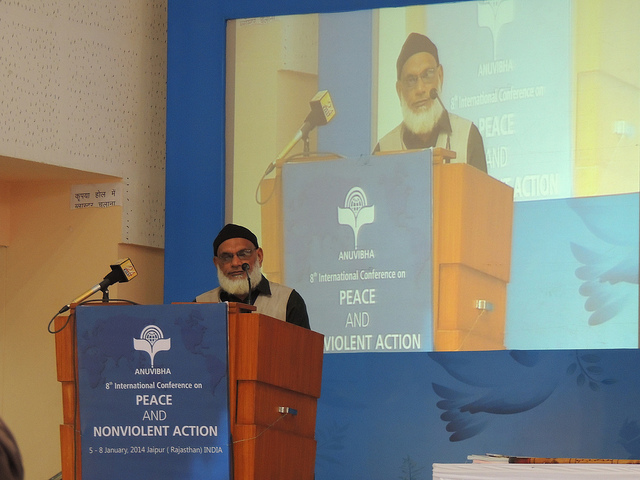
Dr. Muzzammil Cader während seines Vortrags
Wir alle hätten gern Näheres über Konfliktlösung aus der Praxis Dr. Caders gehört, aber der Zeitplan sah weder eine Vertiefung der einmal angesprochenen Themen vor, noch war Zeit für einen Gedankenaustausch eingeplant. So begann die Teepause mit dem Eindruck, dass man sehr viel zu hören bekommen würde und einige Ausdauer im Sitzen entwickeln müsste.
Doch in der zweiten Plenumssitzung dieses Nachmittags kamen unverhofft die Höhepunkte des Tages. Dr. Ben-Eli vom Nachhaltigkeitslabor New York sprach zum Thema „Armut, Umwelt und ökologische Nachhaltigkeit in der Zukunft“. In seinem Vortrag reflektierte er die universale Funktion von Design als Grundlage für die von seinem Nachhaltigkeitslabor entwickelten fünf Kernprinzipien als Bezugssystem für Nachhaltigkeit: die materielle Domäne als die der Existenz zugrundeliegende Regulierungsbasis für Material- und Energiefluss, die ökonomische Domäne als Leitstruktur für Definition, Schaffung und Handhabung von Wohlstand, die Domäne des Lebens für die Bereitstellung der Grundlagen für angemessenes Verhalten in der Biosphäre, die soziale Domäne als Basis sozialer Interaktionen und die spirituelle Domäne als Identifikationsbasis für die Entwicklung eines universalen ethischen Codes, in dem wertorientierte Einstellung und Verhalten korrespondieren. Die Frage nach der Notwendigkeit dieser Prinzipien beantwortete Dr. Ben-Eli ganz einfach: Wer ein Flugzeug konstruieren will, muss die Gesetze der Aerodynamik kennen. Wer Nachhaltigkeit etablieren will, muss die der Nachhaltigkeit zugrundeliegenden Prinzipien kennen.
Ganz logisch folgte auf diese Ausführungen der Vortrag des Amerikaners Dr. Saifer (Südkorea) über das Grüne Selbst. Basierend auf den Ausführungen C.G. Jungs entwickelte er den „grünen“ Archetyp und seinen Schatten. Zwischen Erfahrungen von Entfremdung, ausgelöst durch den konditionierten Impuls zur Überkonsumption, besteht eine Beziehung zum Prozess der Individuation. Angesichts der gegenwärtigen ökologischen Krise vermittelt die Erkenntnis dieser Beziehung ein tiefgreifendes Verständnis der inneren Ursachen, die zu unserer höchst destruktiven und ökologisch nicht nachhaltigen Form globalen Wirtschaftens geführt haben.
Nach den Plenumssitzungen des Nachmittags fanden abends Workshops statt. Es wurden immer drei zugleich angeboten. An diesem ersten Abend zu drei verschiedenen Themenkomplexen: Religiöse, psycho-biologische und soziale Perspektiven über Vergebung, Workshop für Kinder, Friedenstraining, Uns selbst heilen, die Welt heilen, kultureller Jugendaustausch als Vehikel zum Frieden. Wir entschieden uns für das Thema Vergebung, wichtige Grundlage friedvollen Lebens.
Dr. Suneet Verma von der Universität New Delhi sprach über psycho-biologische Forschungen zum Thema. Er führte die Zuhörer durch seine philosophischen Reflektionen über den Vorgang des Vergebens und dessen Auswirkungen auf die Vergebung praktizierende Person und ihre Umwelt in die Thematik ein. Den Vorgang der Vergebung schilderte er als einen Prozess, in dem die Kränkung weder verdrängt, noch entschuldigt wird. Es werden positive Emotionen, Gedanken und positives Verhalten anstelle der durch die Kränkung ausgelösten negativen Emotionen gesetzt, womit die negative Beurteilung der die Kränkung verursachenden Person gestoppt wird. Manchen Menschen fällt Vergebung leichter als anderen, doch ist es jedem möglich zu vergeben.
Samani Charitra Pragya, Rektorin JVBU Ladnun, steuerte Aspekte der Vergebung bei, die sich darauf bezogen, was wir angesichts der gegenwärtigen ökologischen Krise über uns selbst und andere denken. Sie formulierte einen Apell, in dem sie vorschlug, dass jeder im Namen aller Völker der Erde dafür plädiert, die Verantwortung füreinander zu übernehmen und im Hinblick auf die Umwelt nachhaltig handeln zu wollen. Deshalb sollten alle Ahimsa versuchen umzusetzen. Als Methode dazu bezog sie sich auf die Praktiken der Jaina, regelmäßig die Emotionen zu läutern durch beispielsweise Meditation und Rezitation von Mantras.
Als sich alle zum Abendessen wieder trafen, hatte jeder den Eindruck eines erfüllten Tages. Man sprach miteinander und war sich völlig einig über das sehr schmackhafte Essen.
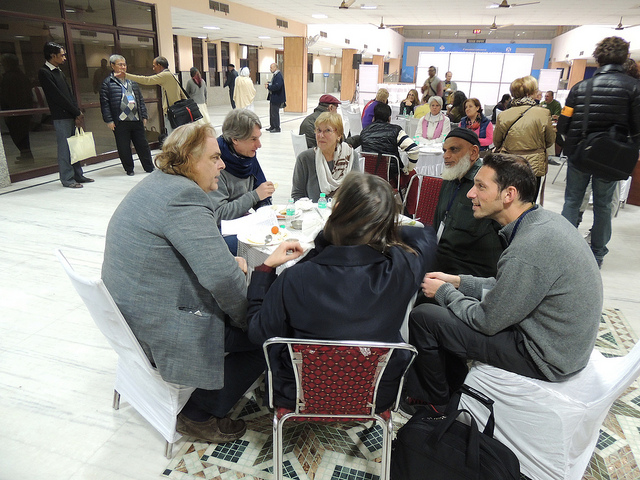
Dr. Thomas Daffern, Graham Peebles, Carla Geerdes, Dr. Muzzammil Cader, Dr. Jonah Saifer, Dr. Deborah Cohen (mit dem Rücken zur Kamera)
PROGRAMME: SUNDAY, 5th January, 2014
| 14.30 Hrs - 16.00 Hrs | FIRST PLENARY SESSION | M. S. (Main Hall) |
THEME: | Nonviolence - Perception, Practice and Concept |
CHAIR: | Prof. Dayanand Bhargava (India) |
SPEAKERS: |
|
16.00 Hrs - 16.30 Hrs
TEA BREAK
16.30 Hrs - 18.00 Hrs
SECOND PLENARY SESSION
M. S. (Main Hall)
THEME:
Poverty, Environment and Eco-Sustainability of the Future
CHAIR:
Prof. Ashok Bapna (India)
SPEAKERS:
- Mr. Michael Ben Eli (UK)
- Mr. Jonah R. Saifer (South Korea)
Details:
Dr. Akash Ouchi
Prof. Dr. Katsuya Kodama
Dr. Muzzammil Cader First Plenary Session: Nonviolence, Perception, Practice and Concept
Nonviolence is a powerful force. It is more than absence of violence. It is about a lifestyle that makes human live as humans. People perceive nonviolence as passive but it is the weapon that could defeat the strongest. Nonviolence needs to be part of life and practiced. Truth and honesty need to be practiced in full for nonviolence to work. The concept of nonviolence finds its origin in all religions and if one properly follows the teachings of his or her own religion, there is no doubt that nonviolence will predominate.
Workshop:
Interfaith Insights, Interreligious Understanding and Cooperation for a Non Violent Future Workshop: Models of Peaceful Co-Existence and the Vision of a Healthy Society Peaceful co-existence is needed between people of different faiths, ethnic groups, races, classes and any different categories of people in the society. The ideal way to develop peaceful co-existence is to start at the grass-root level with ordinary people. We should organize community based groups that would practice and promote a nonviolent way of living. This should include nonviolent practices, economy, environmental concerns, rights and justice, truth and honesty and handling conflicts at the community level to ensure a win–win solution.
Dr. Michael Ben-Eli Dr. Michael Ben-Eli is founder of the Sustainability Laboratory, established in order to develop and demonstrate breakthrough approaches to sustainability practices, expanding prospects and producing positive, life affirming impacts on people and ecosystems in all parts of the world.
Presentation: Sustainability by Design Reflections on the cosmic function of “design” and the potentially anti-entropic role of humans will be followed by a review of the five core sustainability principles, a new framework developed by the Sustainability Laboratory. This framework includes a rigorous definition of sustainability and it provides an essential road map for the development of model sustainability practices. The principles are expressed in relation to five domains: the Material domain, which constitutes the basis for regulating the flow of materials and energy that underlie existence; the Economic domain, which provides a guiding framework for defining, creating and managing wealth; the domain of Life, which provides the basis for appropriate behavior in the biosphere; the Social domain, which provides the basis for social interactions; and the Spiritual domain, which identifies the necessary attitudinal value orientation and provides the basis for a universal code of ethics, ultimately cohering the whole.
Workshop: Project Wadi Attir: Sustainability Principles at Work in the Negev Desert Project Wadi Attir is a groundbreaking initiative of the Bedouin community in the Negev, for establishing a model sustainable agricultural operation. The project was initiated by The Sustainability Laboratory, a US-based non-profit, and the Hura Municipal Council, the governing body of a local Bedouin township. Designed to leverage Bedouin traditional values, aspirations, know-how and experience with modern-day science and cutting edge technologies, Project Wadi Attir showcases implementation of holistic sustainability principles developed by The Lab. It demonstrates an approach to sustainable development in an arid environment, valid and replicable locally as well as in other similar regions around the world. The core of the project includes an organic farming enterprise involving animal husbandry and the production of dairy products; cultivation of medicinal plants and the development of a related line of health products; and the reintroduction of nutritious, indigenous vegetables to common use. At its heart, the project will include a visitor, training and education center, with a focus on ecology, sustainability innovation and entrepreneurship. The project site will be supported by an integrated infrastructure of green technologies including a soil enhancement program; solar energy and bio-gas production; the production of compost from organic waste; advanced irrigation management; and waste water treatment and recycling.
Mr. Jonah R. Saifer
Jonah holds a Masters Degree in Philosophy and Religion from the California Institute of Integral Studies. He is currently an assistant professor of English, Philosophy, and Global Religions at Daegu University in South Korea. His hobbies include traveling, hiking in the mountains, cooking, and composing songs.
Presentation: The Process of Psychological Growth and Evolution The purpose of this paper is to examine the process of psychological growth and evolution – what C.G. Jung called individuation – in the light of current ecological crises. First, this paper will focus on the relationship between ecological crises and experiences of alienation in the modern world. Next, the ‘Green’ Archetype in mythology, theology, and alchemy will be related to Jungian ideas of shadow integration – the struggle with one’s dark side; the coming to awareness of the inner, personified component of the psyche – what Jung called the anima and animus; and the process of fully becoming oneself – individuation. In the final sections, experiences of heightened spiritual awareness in nature and contact with deeper dimensions of the Self will be correlated to possibilities for healing the earth.
This paper will primarily use a Jungian lens to present a vision of individuation, the development of personality, in the light of eco-psychology, philosophy, and comparative theology.Keywords: individuation, earth, sustainability, identification, crisis, consciousness.
Dr. Suneet Verma
Suneet Varma, Ph.D., is Associate Professor at the Department of Psychology, University of Delhi, Delhi (India). His early work was in the area of Theoretical Psychology/Philosophy of Psychology. His more recent work focuses on Indian perspectives on Psychology - e.g. Yoga Psychology, Sufism, Buddhist Psychology, and their links with Sri Aurobindo's Integral Psychology. Dr. Varma’s current work deals with spirituality and healing.
Presentation: Psycho-Biological Research on Forgiveness
When you forgive someone, you make the choice to give up your desire for revenge and feelings of resentment. You also stop judging the person who caused you the hurt. Instead of revenge, resentment, and judgment, you show generosity, compassion, and kindness. In forgiveness, you don’t forget that the offense occurred nor do you excuse it. You substitute your negative with positive feelings, thoughts, and behavior. Some people are naturally forgiving, both toward others and themselves. It’s easier for them to respond to any specific act of the person who’s committed the offense. Those who don’t have this ability may find it more difficult to grant forgiveness when they’ve hurt or harmed, but it is possible for them to do so, depending on the situation. Recent research on the health benefits of forgiveness shows that people who can make this mental shift may benefit in ways they didn’t anticipate—namely, by living longer. In general, studies show that people who forgive are happier and healthier than those who hold resentments. One study has shown that the positive benefit of forgiveness is similar whether it was based upon religious or secular counseling as opposed to a control group that received no forgiveness counseling.
| 18.15 Hrs - 19.45 Hrs | WORKSHOPS |
|
Workshop-1 : Presenters: | Subject : Religious, Psycho-Biological and Social Perspectives on Forgiveness
| Lecture Room 1 |
Workshop-2: | Subject : Workshop for Children (Children's Peace Train)
| Lecture Room 2 |
Workshop-3 : | Subject : Healing Ourselves; Healing the World; Youth Cultural Exchange as a Vehicle for Peace
Subject: A beautiful floating island in the universe.
| Lecture Room 3 |
20.00 Hrs - 21.00 Hrs | Dinner |
|
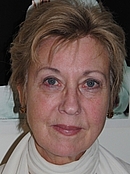 Carla Geerdes
Carla Geerdes
